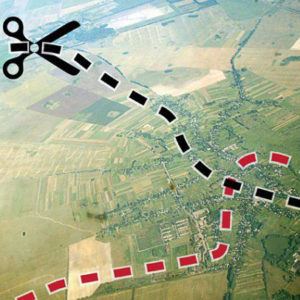
"Everyone who turns to us frees himself from thinking about his question and gets a result, since we value the most important resource of our clients - time."
The right to use someone else’s land for agricultural purposes (emphyteusis)
 An emphyteusis is a long-term, alienable and inherited property right to another's property, which consists in granting a person the right to own and use another's land plot for agricultural needs in order to receive fruits and incomes from it with the duty to use it effectively in accordance with its intended purpose.
An emphyteusis is a long-term, alienable and inherited property right to another's property, which consists in granting a person the right to own and use another's land plot for agricultural needs in order to receive fruits and incomes from it with the duty to use it effectively in accordance with its intended purpose.
The subjects of emphyteusis are the owner of the land person who has expressed a desire to use the latter for agricultural needs (land user, emphytevta).
The object of the law of empathy is the use of agricultural land, which is in private, communal or state ownership. Agricultural land includes agricultural land - arable land, perennial plantings, hayfields, pastures and deposits, as well as non-agricultural land (Article 22 of the Land Code
The basis for establishing emphyteusis is an agreement on granting the right to use someone else's land for agricultural needs (an agreement on emphyteusis). According to the emphyteusis agreement, the owner of the land plot shall compensate or donate to another person the right to use the land plot, while retaining the right of ownership in relation to it. The agreement on the establishment of emphyteusis is formally consensual, since no transfer of the land plot is required for the emergence of emphyteutic law. At the same time, it is impossible to realize this right earlier than the boundaries of the site are established on the ground, since it is prohibited by law to start using the land (art. 125 LC).
An emphyteusis can be transferred to another person on the basis of a contract between the previous and subsequent land users or on the basis of inheritance (part 2 of article 4007 of the Civil Code). In particular, the right of empowerment may be the subject of a contract of sale, donation, barter, including the subject of a pledge, and may also be transferred by any other, not prohibited by law, method to another natural or legal person. When alienating emphyteusis, it is not about the transfer of ownership of land, but only about the alienation of the right to use it.
The term of the agreement on emphyteusis is established by agreement of its parties. In this case, the owner of the site and emphytevta can conclude such a contract for a definite or indefinite period.
If an agreement on granting the right to use another's land plot for agricultural needs has been concluded for an indefinite period, each party may cancel the agreement, warning the other party about this for at least one year (Article 408 of the Civil Code). A warning of withdrawal from an agreement is a transaction, therefore its content and form are determined by the general rules on carrying out transactions set out in Chapter 16 of the Civil Code.
The land owner has the right to:
- require the land user to use the plot for its intended purpose, established in the contract. In this case, the contract itself must take into account the purpose of the site (Article 409 of the Civil Code)
- to receive payment for the use of the site. The fee for coquetry to be paid by the land user to the land owner does not cover other obligatory payments that are established by a separate law (part 2 of article 410 of the Civil Code). The Civil Code does not establish the size of the user fee, its forms, conditions, procedure and terms of payment; these issues are resolved at the discretion of the parties and must be enshrined in the agreement on emphyteusis
- prior to other persons acquiring the right to use a land plot in case of the sale of this right to another person (part 2 of article 411 of the Civil Code)
- receiving interest on the sale price of emphyteusis to another person - laudemia (Part 5, Article 4 of the Civil Code).
The owner of the land plot must:
- provide land for use;
- not to prevent the land user from exercising his rights.
Even in case of violation of the conditions for exercising the right to use, the owner does not have the right to arbitrarily prevent him from committing such actions, but must go to court. Against a violation by the owner of his rights, the land user is protected by all those means of protection, and the owner of the property (Article 366 of the Civil Code).
The land user has the right to:
- use the land plot in full in accordance with the contract and keep it for yourself (part 4 of the Civil Code)
- acquire ownership of the fruits and income from the operation of the land plot provided for use. This right is logically derived from the right to use the land for its own needs;
- to alienate the right to use a land plot for agricultural needs, unless otherwise provided by law (part 4 of the Civil Code).
It should be noted that the latter competence of the land user in some cases is accompanied by significant restrictions established in favor of the owner of the land. In particular, in the case of the sale of the right to use a land plot, the owner of the land has the right over other persons to acquire it at the price declared for sale and on other equal conditions. To ensure this right of the landowner, the implementation of emphyteusis through the sale is accompanied by a complicated procedure. The seller of the emphyteusis is obliged to notify in writing the owner of the land plot granted for use of the intention to sell his right to use to another person, indicating the price announced for sale and other conditions. The owner, who within one month in writing declares his intention to redeem emphyteusis, is obliged to buy it at a price and on terms and conditions announced for sale. If the owner of the land refuses to exercise his preemptive right to purchase an emphyteusis or does not notify in writing about the consent to purchase, or sends an agreement about a possible purchase at a different price, the land user is entitled to sell his right to any person, but on conditions previously announced for sale. If the landowner, by giving consent to the purchase of emphyteusis, then gives up his intention, the land user can demand compensation for the damage caused by such a refusal (art. 22, 23 GK).
In case a land user sells an emphyteusis, violating the owner’s right to preemptive purchase, the latter may file a lawsuit within one year for transferring the rights and obligations of the acquirer of the right to him with a deposit to the court’s deposit account that the buyer must pay (Article .362, part 4 of article 411 of the Civil Code).
The land user must:
- to pay for the use of the land plot, as well as other payments established by law. The usage fee, which is paid to the site owner, does not include other payments payable by the land user in accordance with the provisions of the law. The specified fee for use does not cover the obligation of the user to pay the owner of the land a laudemia (part 5 of article 421 of the Civil Code)
- effectively use the land in accordance with its intended purpose;
- improve the fertility of the land, apply environmental technologies of production, refrain from actions that may lead to the deterioration of the ecological situation;
- inform the owner of the land of the intention to sell the right to use the land.
Amphitephase stops when:
1) the combination of the owner of the land plot and the land user in one person. In this case, the subjects of ownership and property rights to someone else's thing are the same, and therefore have the advantage of a more complete right, that is, the right of ownership;
2) expiration of the term for which the emphyteusis was granted, if the term was noted in the agreement on the establishment of this right. In the Civil Code there is no provision for the owner of the site to extend the duration of an emphyteusis at the request of the land user. Such a duty may be enshrined in the agreement on the establishment of emphyteusis. In the event that the parties reach an agreement on the extension of the period, it is a matter of establishing a new emphyteusis;
3) the redemption of the land in connection with public necessity. In this case we are talking about the redemption of the land, and not the right to use (Article 350 of the Civil Code)
4) destruction of a land plot or such damage to it, excludes the possibility of using it to meet agricultural needs;
5) recognition of the transaction as invalid, which is the establishment of emphyteusis;
6) use of the land plot for a purpose other than the intended purpose (Article 143 of the Land Code);
7) the agreement of the land plot owner and the land user on the termination of emphyteusis. Such an agreement should be perfect in the same form as the agreement on the establishment of emphyteusis. By a court decision, emphyteusis may also be terminated in other cases established by law (Article 412 of the Civil Code).
Calculate the price of assistance:
1 question
Have other lawyers handled your case?
2 question
Are you in Kyiv or Kyiv region?
3 question
Do you need legal assistance urgently?
Other articles on this topic:
call back
during the day




